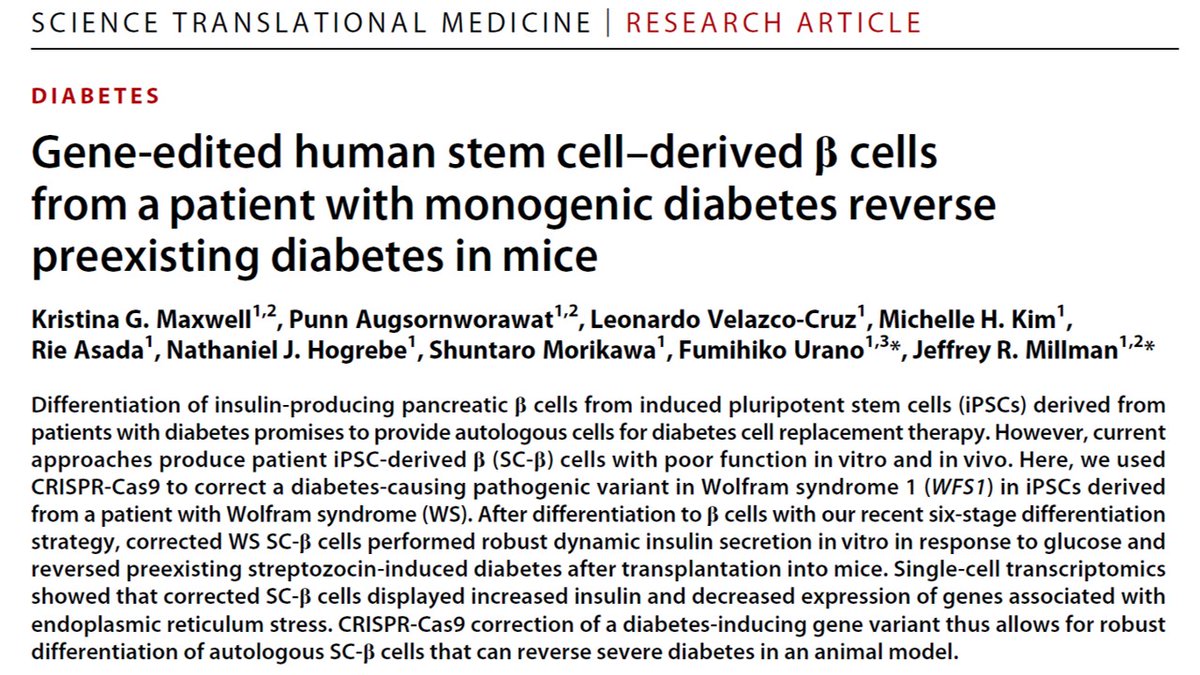Later than I wanted, but now it is Twitter story time for our Science Translational Medicine! This will include some description of the big challenges we faced, which may be of interest to those in the field. (Also, please DM or email me if you want a PDF copy of the article) 1/n
Shortly after moving to @WUSTLmed about 4.5 years ago, I started working with @FumihikoUrano to leverage our technology for differentiating insulin-producing beta cells from stem cells for his patients 2/n
Dr. Urano has dedicated much of his research and clinical practice to patients with Wolfram syndrome, which causes diabetes and other ailments by pathogenic variants in the WFS1 gene. Their and their family’s support has help with any ongoing advancements 3/n
His team had already generated iPS cells from several patients. So we used CRISPR-Cas9 to correct the mutation in a few lines and started trying to use our suspension-based differentiation protocol to make beta cells for study. This is where we started to encounter problems 4/n
While we had great success with the gene-corrected cell lines (they would make SC-beta cells that were indistinguishable from SC-beta cells made from healthy donors), we couldn’t make SC-beta cells with the diabetic/unedited iPS cells 5/n
The cause of this failure was very early in the process, with either the stem cells or early differentiation stages (endoderm) failing because of apparent cell death 6/n
We suspected that the combination of stress from being in suspension culture in a stirred reactor plus ER stress due to the WFS1 mutations were too much for these cells to handle 7/n
. @KristinaGMaxwel was a trooper, and tried all the tricks she and I could think of in order to make the unedited patient-derived iPS cells compatible with suspension-based differentiation 8/n
While we were very excited the corrected iPS cells could make apparently healthy beta cells, being unable to compare them to isogenic unedited beta cells would really limit our study 9/n
In parallel research in my lab at the time, we had recently developed a new and improved differentiation protocol (now published ~2 months ago in @NatureBiotech) that also had the benefit of eliminating the requirement of suspension-culture in the differentiation 10/n
. @KristinaGMaxwel was able to make SC-beta cells from unedited patient iPS cells in her first attempt with this new protocol, enabling this study comparing corrected vs unedited patient-derived SC-beta cells to occur 11/n
While both corrected and unedited iPS cells could make SC-beta cells, there were major differences that we detected 12/n
Perhaps the most important was that, while both corrected and unedited cells could secrete insulin, unedited SC-beta cells had reduced insulin secretion per cell and reduced glucose-responsiveness, with weak first and second phase insulin release 13/n
This resulted in our corrected SC-beta cells being able to rapidly reverse severe pre-existing diabetes in mice (~1 wk). This correction was maintained for half a year (the end of the observation period) 14/n
The unedited SC-beta cells were never able to return the mice to normoglycemia. This was not only due to their low insulin secretion and weak glucose-responsiveness, but much of the insulin they were secreting was unprocessed (and thus non-functional) 15/n
I wanted to point out that this study would had been difficult to do with earlier differentiation protocols, such as the one published in our 2014 Cell paper, since many of the functional defects that we observed in unedited SC-beta cells.. 16/n
..such as 1st and 2nd phase secretion, cannot be obtained with those old protocols. I think it is important for the field to continue developing methods to make more mature and ‘adult-like’ SC-beta cells not only for cellular therapy but for better disease modeling in lab 17/n
Much like @_diegobalboa_ and @OtonkoskiT’s great work with iPS cells and neonatal diabetes, we found that using scRNA-seq to be incredibly useful https://elifesciences.org/articles/38519 ">https://elifesciences.org/articles/... 18/n
It was particularly useful here because it allowed for us to control for the fact that we generated a higher fraction of SC-beta cells from corrected compared to unedited iPS cells 19/n
With it, we were able to detect increases in the expression of many stress marker transcripts in unedited SC-beta cells, while most beta cell markers (with the notable exception of INS) were actually comparable 20/n
I want to emphasize how important scRNA-seq was here - if we only relied on bulk population methods, like qPCR, we would had been led to the wrong conclusion that many beta cell markers were underexpressed in unedited cells because of dilution by non-SC-beta cells 21/n
In addition, scRNA-seq revealed the presence of many non-pancreatic endocrine off-targets made by our differentiation protocol with the unedited iPS cells, such as neural cell and exocrine. The cause of this is a big mystery to us at this time 22/n
One challenge that we didn’t, in my opinion, satisfactory overcome was more in-depth analysis of the response of these cells to stress and their stress-response pathways 23/n
The fact these markers are highly expression in beta cells even under basal/healthy conditions and corrected iPS cells made more beta cells than the unedited cells made bulk-population assessments, like western blots, problematic. Something more sophisticated is necessary 24/n
This Twitter story ended up much longer than I intended. But I hope that this study will be helpful for those interested in autologous cell therapy and adapting SC-beta cell technology for disease modeling/drug screening 24/24 END

 Read on Twitter
Read on Twitter


